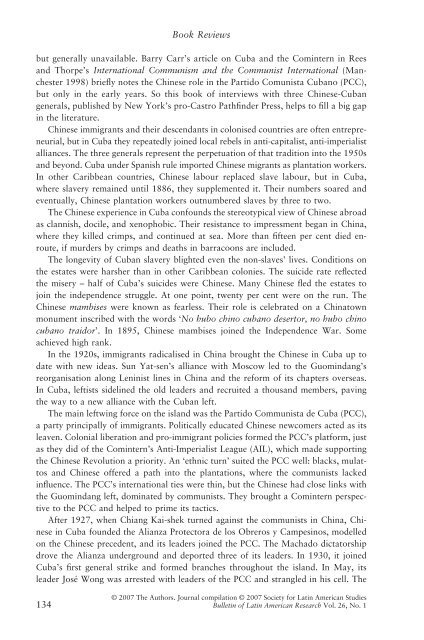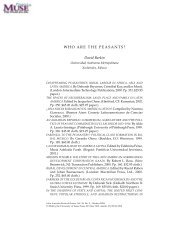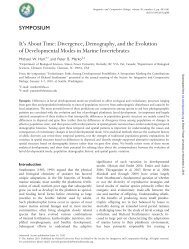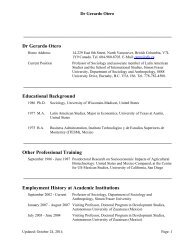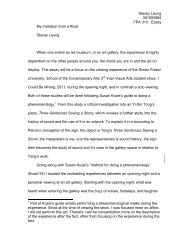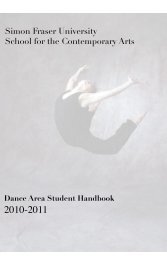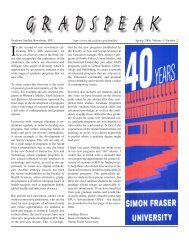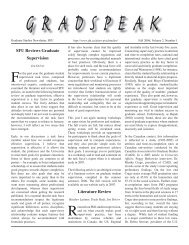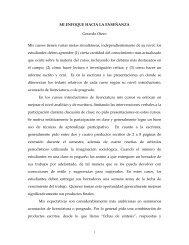Review of Mexico in Transition by Byron Crites
Review of Mexico in Transition by Byron Crites
Review of Mexico in Transition by Byron Crites
- TAGS
- transition
- byron
- crites
- cgi.sfu.ca
You also want an ePaper? Increase the reach of your titles
YUMPU automatically turns print PDFs into web optimized ePapers that Google loves.
Book <strong>Review</strong>s<br />
but generally unavailable. Barry Carr ’ s article on Cuba and the Com<strong>in</strong>tern <strong>in</strong> Rees<br />
and Thorpe ’ s International Communism and the Communist International (Manchester<br />
1998) briefl y notes the Ch<strong>in</strong>ese role <strong>in</strong> the Partido Comunista Cubano (PCC),<br />
but only <strong>in</strong> the early years. So this book <strong>of</strong> <strong>in</strong>terviews with three Ch<strong>in</strong>ese-Cuban<br />
generals, published <strong>by</strong> New York ’ s pro-Castro Pathfi nder Press, helps to fi ll a big gap<br />
<strong>in</strong> the literature.<br />
Ch<strong>in</strong>ese immigrants and their descendants <strong>in</strong> colonised countries are <strong>of</strong>ten entrepreneurial,<br />
but <strong>in</strong> Cuba they repeatedly jo<strong>in</strong>ed local rebels <strong>in</strong> anti-capitalist, anti-imperialist<br />
alliances. The three generals represent the perpetuation <strong>of</strong> that tradition <strong>in</strong>to the 1950s<br />
and beyond. Cuba under Spanish rule imported Ch<strong>in</strong>ese migrants as plantation workers.<br />
In other Caribbean countries, Ch<strong>in</strong>ese labour replaced slave labour, but <strong>in</strong> Cuba,<br />
where slavery rema<strong>in</strong>ed until 1886, they supplemented it. Their numbers soared and<br />
eventually, Ch<strong>in</strong>ese plantation workers outnumbered slaves <strong>by</strong> three to two.<br />
The Ch<strong>in</strong>ese experience <strong>in</strong> Cuba confounds the stereotypical view <strong>of</strong> Ch<strong>in</strong>ese abroad<br />
as clannish, docile, and xenophobic. Their resistance to impressment began <strong>in</strong> Ch<strong>in</strong>a,<br />
where they killed crimps, and cont<strong>in</strong>ued at sea. More than fi fteen per cent died enroute,<br />
if murders <strong>by</strong> crimps and deaths <strong>in</strong> barracoons are <strong>in</strong>cluded.<br />
The longevity <strong>of</strong> Cuban slavery blighted even the non-slaves ’ lives. Conditions on<br />
the estates were harsher than <strong>in</strong> other Caribbean colonies. The suicide rate refl ected<br />
the misery – half <strong>of</strong> Cuba ’ s suicides were Ch<strong>in</strong>ese. Many Ch<strong>in</strong>ese fl ed the estates to<br />
jo<strong>in</strong> the <strong>in</strong>dependence struggle. At one po<strong>in</strong>t, twenty per cent were on the run. The<br />
Ch<strong>in</strong>ese mambises were known as fearless. Their role is celebrated on a Ch<strong>in</strong>atown<br />
monument <strong>in</strong>scribed with the words ‘ No hubo ch<strong>in</strong>o cubano desertor, no hubo ch<strong>in</strong>o<br />
cubano traidor ’ . In 1895, Ch<strong>in</strong>ese mambises jo<strong>in</strong>ed the Independence War. Some<br />
achieved high rank.<br />
In the 1920s, immigrants radicalised <strong>in</strong> Ch<strong>in</strong>a brought the Ch<strong>in</strong>ese <strong>in</strong> Cuba up to<br />
date with new ideas. Sun Yat-sen ’ s alliance with Moscow led to the Guom<strong>in</strong>dang ’ s<br />
reorganisation along Len<strong>in</strong>ist l<strong>in</strong>es <strong>in</strong> Ch<strong>in</strong>a and the reform <strong>of</strong> its chapters overseas.<br />
In Cuba, leftists sidel<strong>in</strong>ed the old leaders and recruited a thousand members, pav<strong>in</strong>g<br />
the way to a new alliance with the Cuban left.<br />
The ma<strong>in</strong> leftw<strong>in</strong>g force on the island was the Partido Communista de Cuba (PCC),<br />
a party pr<strong>in</strong>cipally <strong>of</strong> immigrants. Politically educated Ch<strong>in</strong>ese newcomers acted as its<br />
leaven. Colonial liberation and pro-immigrant policies formed the PCC ’ s platform, just<br />
as they did <strong>of</strong> the Com<strong>in</strong>tern ’ s Anti-Imperialist League (AIL), which made support<strong>in</strong>g<br />
the Ch<strong>in</strong>ese Revolution a priority. An ‘ ethnic turn ’ suited the PCC well: blacks, mulattos<br />
and Ch<strong>in</strong>ese <strong>of</strong>fered a path <strong>in</strong>to the plantations, where the communists lacked<br />
<strong>in</strong>fl uence. The PCC ’ s <strong>in</strong>ternational ties were th<strong>in</strong>, but the Ch<strong>in</strong>ese had close l<strong>in</strong>ks with<br />
the Guom<strong>in</strong>dang left, dom<strong>in</strong>ated <strong>by</strong> communists. They brought a Com<strong>in</strong>tern perspective<br />
to the PCC and helped to prime its tactics.<br />
After 1927, when Chiang Kai-shek turned aga<strong>in</strong>st the communists <strong>in</strong> Ch<strong>in</strong>a, Ch<strong>in</strong>ese<br />
<strong>in</strong> Cuba founded the Alianza Protectora de los Obreros y Campes<strong>in</strong>os, modelled<br />
on the Ch<strong>in</strong>ese precedent, and its leaders jo<strong>in</strong>ed the PCC. The Machado dictatorship<br />
drove the Alianza underground and deported three <strong>of</strong> its leaders. In 1930, it jo<strong>in</strong>ed<br />
Cuba ’ s fi rst general strike and formed branches throughout the island. In May, its<br />
leader José Wong was arrested with leaders <strong>of</strong> the PCC and strangled <strong>in</strong> his cell. The<br />
© 2007 The Authors. Journal compilation © 2007 Society for Lat<strong>in</strong> American Studies<br />
134 Bullet<strong>in</strong> <strong>of</strong> Lat<strong>in</strong> American Research Vol. 26, No. 1


